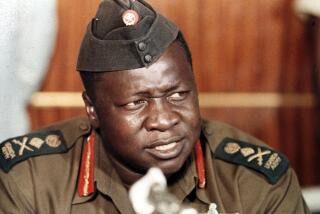Debts closed in on Egypt man who died hanged in his jail cell
His mother visited him hours before he twisted the edges of his blanket into a rope.
“You’ll be out soon,” she told him. “We paid bail.”
“There’s a problem,” he said. “I owe more.”
He hadn’t been in his village in months, a scrap of a place tucked amid fields that stretch past the canal to the paved road. The boys on this land learn early to sharpen plow blades and make scarecrows out of grain sacks. It’s cold when the rain blows and tough to make a living on, even for a man who cuts furrows.
He came home, but in a way no one wanted.
“I guess his life just went black,” said the detective who was called the day guards found Shawadfi Mohamed in his cell.
“Every time he settled one debt there were others waiting for him,” said his wife, Wafaa.
Carpenter. Driver. Farmhand. Mohamed was all of them. But they weren’t enough in the frayed economy of the Nile Delta. Men running for parliament came up here and said things would get better; maybe they will, but they haven’t for decades. No one from Mohamed’s village went to the revolution last year in Cairo’s Tahrir Square; it was too far and there was no money to get down there and back.
People talk about a new Egypt, but it hasn’t found the delta yet.
The detective, a big man with a mustache who, as is customary with police officials here, asked not to be named, moved his hand in front of him like a plane in a nosedive: “It was bad before the revolution, now it’s worse,” he said, sitting in the station house. “People can’t afford anything unless it’s on installments. They don’t have birth control, they have a lot of kids, and they have to pay for a lot of weddings and it’s all tied up in installments.”
A man in the delta is not a man until he’s married. Mohamed met Wafaa, a girl from another village, seven years ago. She caught his eye and he went to her family, who said yes. He started borrowing money for the dowry, the wedding, and then the children came — three boys in five years. He thought about going to work in Libya, like many others in the delta before Libya had its own revolution, but the police wouldn’t grant him a passport with all his debts.
“He loved his wife and kids,” said Hamid, Mohamed’s uncle. “He just wanted better for them.”
Mohamed had $5,000 worth of IOUs spread out for miles. In this stingy land, it was a sum impossible to make good on unless a man turned to darker things.
Mohamed seemed to have tapped everybody. He shared four rooms with his mother, wife, children, brother and sister-in-law. The home sat at the end of a field, ducks squawking outside, the women bent, planting and tending. Smoke from brick kilns turned the sky to rust and the desert crept in from the fringes. Mohamed’s father, a farmhand, had his own debts. He disappeared a while back.
The law came for Mohamed four months ago with a list of all that he owed. He landed in jail. The family learned how deeply he had borrowed; it was like turning the pages of a mystery. In Egypt, when a debt is not paid, a complaint is filed with the police and the borrower is imprisoned until the money is made good on or forgiven. Some of the men Mohamed owed had already filed complaints; others were threatening.
He didn’t see a way out. Wafaa tried to cheer him up. She gathered her sons and went to a man who took a picture of them with Donald Duck dolls against a fake blue paper sky. She took it to the jail.
“He was a good, straight man,” said another uncle, Reda. “He did nothing wrong in his life. He never smoked a cigarette until he went to jail. That was the only bad thing he did.”
Family members went begging for his bail. They raised $120. His mother, Omnasser, took it to the jail, where a clerk sat downstairs in front of cracked leather-bound books that held the misdemeanors and felonies of a province. She posted bail and brought her son a blanket and coming-home clothes.
“I told him, ‘You’re getting out tomorrow,’” she said. “He was happy and he said, ‘Just leave me the blanket for the night. It gets cold.’”
She returned to the jail the next day, Thursday, Jan. 19.
“He wasn’t freed. We found out we still owed 200 pounds [about $33],” she said. “We didn’t have the money, so he’d have to wait.”
She left. Her son was in the cell alone. It was a quiet day. Even if the family could raise the $33, Mohamed had thousands more in debts, a stack of pink slips with official stamps and scribbled amounts. Police said he ripped the border from the blanket, twisted it and tied it to a bar in the window. Guards found him when they brought in a new prisoner. They cut him down and called his mother.
“It had only been two hours since I saw him,” she said. “I was at a wedding and they gave me the news. He wasn’t that desperate. I don’t believe he killed himself.”
“The window was too low,” Wafaa said. “I saw the blanket tied to the bar. He wouldn’t do that. We want an investigation.”
The walls were bare in Mohamed’s home. A TV sat in the corner, a radio played verses from the Koran. Omnasser and Wafaa wore mourning black. Wafaa leaned against a door and acted as if a rope were around her neck to show that her husband was too tall to hang himself from the jail window. The uncles nodded. The room was dark; someone pushed open the shutters and it filled with light from the alley near the mosque. A boy swept the carpet.
Mohamed had dropped out of school at 13, someone said. He’d started off as a carpenter, worked rice paddies and bean and wheat fields, but no job was ever steady enough.
The call to prayer broke their conversation. One of Mohamed’s uncles got up and left for the mosque. The preacher’s voice, which touched every cranny of the village, was scratchy over the loudspeaker. It went quiet for a moment, then other sounds stirred. A man led his sheep to market on the dirt road; around the bend, boys and men patched tractor tires and tinkered with engine parts that lay scattered like silver puzzles. A man on a stoop shook his head when he heard Mohamed’s name. Everyone knew about Mohamed.
He has gone away but his debts have stayed. He had listed Wafaa as a cosigner on a lot of the pink slips. The burden now falls to her.
The detective lighted another cigarette in the station house and fidgeted with a strand of beads. He didn’t see a way out for Wafaa; forgiveness does not come easily in a desperate land. Voices and the rustle of paperwork filled the hallways; the building echoed with jangled keys and slammed doors. Downstairs families filed complaints, others waited for visiting hours.
“The wife should be in jail but because of what happened we haven’t picked her up yet,” he said. “But one day we’ll have to if the debts aren’t paid.”
Amro Hassan of The Times’ Cairo bureau contributed to this report.
More to Read
Start your day right
Sign up for Essential California for news, features and recommendations from the L.A. Times and beyond in your inbox six days a week.
You may occasionally receive promotional content from the Los Angeles Times.







